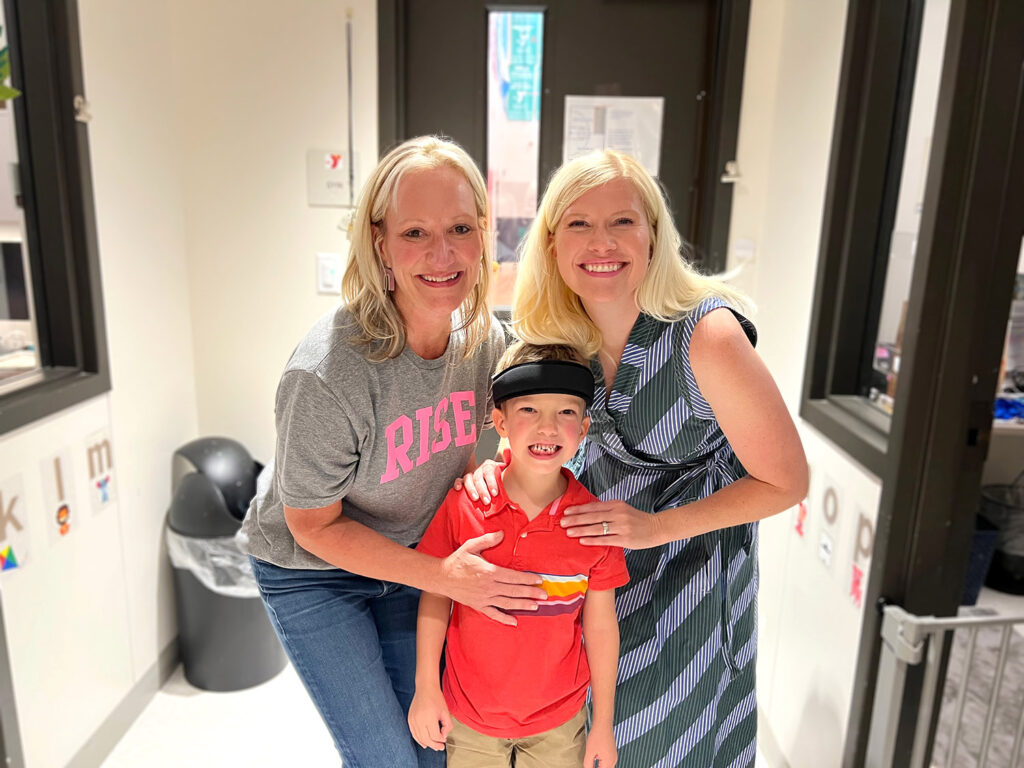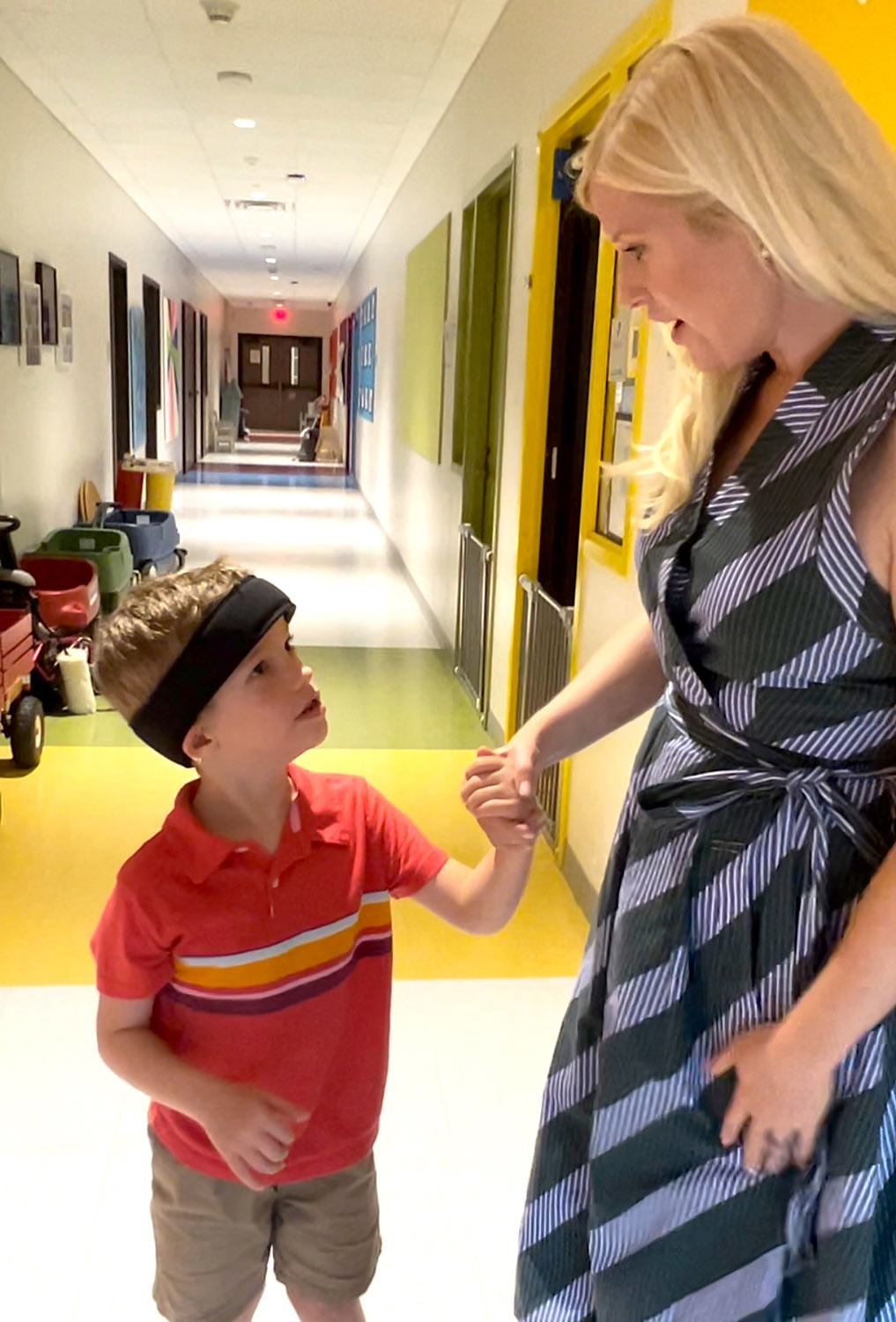Story, Photos, and Video by Lawson Martin.

When Ryan Gole was six months old, his family realized his development wasn’t progressing. Then, when he was around nine months old, his occupational therapist at the time also noticed Ryan’s developmental delays and pushed his parents to explore their options. Around this time, Ryan started seeing a neurologist and a mix of therapists and doctors. Ryan underwent nine months of MRIs, tests, and doctor visits. After the third round of genetics testing, Ryan’s family got clarity and a diagnosis: chromosome 13 deletion.
“At least we knew, OK, the reason why he’s delayed is he’s missing genes that help with development. That explains stuff,” Ryan’s mom, Kristi Gole, says.
Chromosome 13 deletion is a rare condition with a missing copy of genetic material on the long arm of chromosome 13.
“Ryan is missing 31 genes on chromosome 13q. So, everyone has about 25,000 genes, and he’s missing 31, which happen to be on this one chromosome. We’re still learning what that means,” Kristi says.
Chromosome 13 deletion was identified in the 1960s, and in the last 60 years, fewer than 200 people have been diagnosed with it. Of those diagnosed with chromosome 13 deletion, no one is missing the same genetic material, according to Kristi, which makes Ryan “truly a one in a billion kid; no one has exactly what he has.”
Kristi connected with a few people who have children with chromosome 13 deletion and noted their kids’ conditions were “completely different” than Ryan.
“What my son is experiencing and not experiencing is a completely different scenario than what they are,” she said.
While little was known about his condition, it was clear to Kristi and her husband that Ryan would need more help and resources going forward.
Then Kristi’s family discovered The Ashford Rise School of Dallas. The Rise School is located in the Moody Family YMCA. The school provides high-quality early education services to children ages six months to six years with and without disabilities. The Rise School has master’s level educators and speech, physical, occupational, and music therapists. There’s also a low ratio of students to teachers to ensure their safety and growth.
“We work in an inclusive environment, so all the therapies are integrated into the classroom for our traditional and nontraditional learners,” says Lisa Cheek, one of Ryan’s pediatric occupational therapists at The Rise School. “Our biggest goal is to work on the kids being as independent as possible, and that’s for all kids in the classroom. We work on fine motor skills, sensory skills, gross motor skills, daily living, dressing, feeding, and pretty much everything that makes a kid be independent.”
Every child who attends the school, whether a traditional or nontraditional learner, receives therapy services at Rise. Lisa said this is to be “inclusive” of all children and help them reach significant milestones in their own lives.
“It was great to know that my son would be around kids that are different. And then, you know, that way he doesn’t feel left out and doesn’t feel left behind,” Ryan’s mom says. “And from a confidence perspective… everyone here has different things that they’re bringing to the table.”
Chromosome 13 deletion affects the part of Ryan’s brain responsible for motor control. He is visually impaired and struggles with balance because of his condition.
Ryan’s disability causes him to be unstable on his feet while standing or walking. His therapists at The Rise School are not only helping him strengthen his core and walking skills, but are also teaching him how to properly catch himself when he falls.
Since coming to The Rise School, Ryan has dramatically improved his stability. Ryan started crawling at age two and began walking at 3.5 years old.
“He wants to be independent, and they’re teaching him how to do that,” Kristi says.
According to his therapist, Lisa, Ryan has conquered transitional movements, moving from sitting to a four-point position to standing, running, and jumping. They’re currently working on his balance on a balance beam. Ryan recently wrote his name on his own, thanks to help from his therapists, and they’re now trying to get him to write his name on a line in a smaller space. Ryan can now cut with scissors, and his therapists say he’ll cut on curve lines and complex patterns soon.
In the near future, Ryan will be working on writing words and then sentences.

“I think the biggest thing is not putting a timeline to it. He very much might get there, and we expect he will. It might just take two or three times longer than it would for another child. And there’s a chance he may not get there, but that’s alright. We’re still going to work at it until he proves us otherwise,” Kristi says.
Lisa loves the collaboration between the therapists and teachers at The Rise School. According to her, the therapists and teachers constantly sit down, ask what a child learned with another therapist, and pick up where the other left off. This “integrated therapy” is what makes The Rise School so successful.
“It gives me hope in the world,” Lisa says, adding that she loves the positivity and joy the school brings her and the families who attend it. “I see progress every day when I come in here. There’s somebody who’s progressing at something. And we celebrate those small feats that may seem small to other people, but to us and the parents, it’s huge.”
For Kristi, she gained more than just a healthy and confident child. She also gained a support system she desperately needed.
“Rise truly has been everything. When he was diagnosed and when we realized his course was going to be different, we totally were alone,” Kristi says, wiping away a tear from her eye. “Like we had friends and family nearby, and everyone wanted to be there, but we’ve never experienced this, and they hadn’t either. So we were alone in that.”
Kristi shares that she and her husband did not have a network that could understand what they were going through until they found The Rise School. She says she was instantly introduced to a community of families going through similar situations. According to her, everyone at Rise just “got it.”
“The staff got it. The teachers get it. The therapists get it,” she says. “It’s so essential to have those people who get it and who have the tips to give you and just the listening ear.”
Sometimes a listening ear, a hug, and a support system are all you need.
“I just keep saying it’s Rise. Like, without Rise…,” Kristi says, pausing and shrugging, “I’m not going to think of that.”
Sign up with your email address to receive good stories, events, and volunteer opportunities in your inbox.